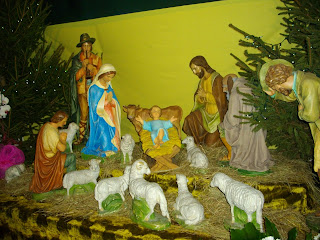


Watching Nativity scenes - is a family tradition in Poland.
Christmas Eve - Wigilia
The Wigilia Meal is traditionally a meatless meal as it completes the fast which awaits the birth of God. The waiting or vigil (Wigilia) culminates in the sharing of the Christmas Wafer and the Wigilia Meal. It requires special traditional table setting and a festive menu of traditional dishes. The dinner is generally followed by singing of Carols and culminates in the Eucharistic Meal at the Midnight or Shepherd's Mass. The meal consists of a wide variety of special holiday dishes, all meatless. Customs vary throughout Poland; some families present twelve dishes for the twelve Apostles. Most serve an odd number of courses: 7, 9, or 11. The Wigilia dishes are prepared according to beloved family recipes. The foods are to represent the four corners of the earth: the mushrooms from the forest, grain from the fields, fruit from the orchards, fish from the lakes and sea. The meal always begins with a special soup, such as a Christmas Borscht with mushroom dumplings, followed by many elegant fish preparations, vegetables, and the beloved Polish pierogi. Typical dishes include carp in aspic, herring, breaded white fish, meatless cabbage rolls, noodles with poppy seed, noodles with cabbage and Polish mushrooms.
Typical Wigilia Menu: Appetizers :Smoked White fish, Pickled Vegetables, Cheese Selection
Soup: Christmas Borscht with mushroom dumplings, Main Course:Herring, Vegetables Salad, dumplings with polish mushrooms, White fish; Deserts: Poppy Seed, Honey Spice Cakes, stewed from dried fruit.
Christmas Wafer – Opłatek
The Polish family breaks the Wafer (Opłatek) on Christmas Eve (Wigilia) as their ancestors before them have done. The sacred white wafers, much like those used for Holy Communion, are shared with each person present. During the exchange, good wishes are expressed. This is the most emotional time of the holiday for the Polish family. Those who are no longer alive are particularly remembered at this moment. The pink wafer is shared with the animals who, according to Polish tradition, because they were first to greet the Baby Jesus speak at midnight. This is the most sacred night in the Polish -Polonian Home.
The Midnight Mass
Poles call the Midnight Mass the Shepherd's Mass or Pasterka. Traditionally, the family's Wigilia celebration culminates when all go together to Mass. The Midnight Mass is usually preceded by communal singing of the beloved Polish Koledy. The Mass itself is a joyous and majestic liturgical event, because Bog Sie Rodzi--God is Born, as the great Polish Carol says. It is also traditional for families to visit the Crèche to pray together to the Infant Jesus. This is particularly emphasized in families with young children. Following Mass, many families return home for a snack and more celebration.